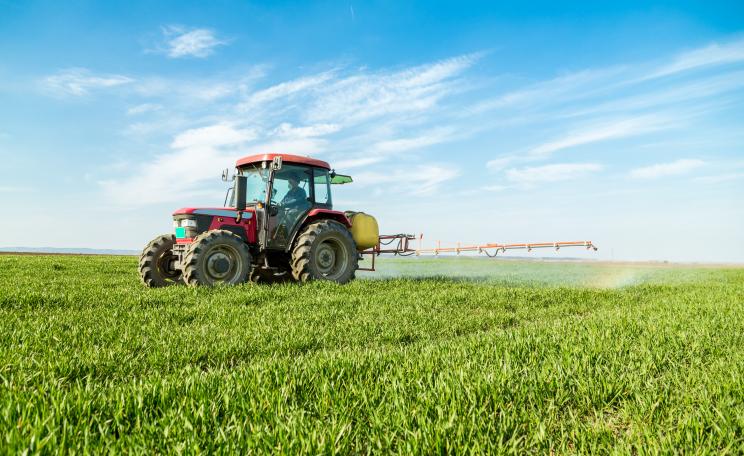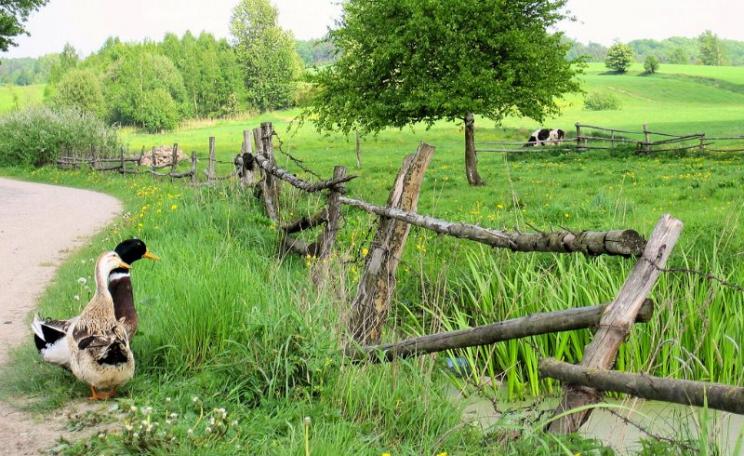In twelve years, what started out as a human interaction based on trust, knowledge and good powers of observation, turned into a lesson on the finer points of bureaucracy, book keeping and paper management.
I remember quite well the first time I had my farm inspected. It was around 1984 and I had just completed the conversion of my land to an organic system, a process begun in 1975.
It started with a phone call to a senior Soil Association Council member, himself an organic practitioner with land not far from my farm.
"We'll get someone down to you next week", said the chirpy voice on the other end of the phone.
"The inspection will take around two to three hours and will involve having a good look around the land and checking your barns and storage buildings."
In those days, it was all about the farm
The visit was duly arranged, and sure enough, on the appointed day, the inspector rang the doorbell and announced his presence.
The first thing we both did was to don our wellies and head out across the fields. I was curious what his observations would be. Soon he was expressing enthusiasm for the abundant worm casts that covered the permanent pasture that comprises around one third of my farmland. "Sure sign of good soil fertility", he said.
Next we were peering at a recently sown grass / clover ley with additional herbs sown as part of the mix. "Hmm ... nice take on the Meadow Fescue, but the clovers are a little thin, usually a sign of too high a level of acidity in the soil - why not get a soil sample taken to test your PH?"
Moving on at a fair old pace, we came to a field of rye. "Wonderful weed suppressor, rye", he volunteered. "Good choice for poor land - does well on lighter sandy soils that other crops find tough going."
This man clearly knew his stuff
Soon he was moving along the headland looking earnestly around the field. "Looking for something?" I asked. "Sure, looking for any signs that a sprayer might have been in operation on this crop. It's easy to spot - tramlines, and discolouration of the plant leaves - nothing like that here I'm glad to say."
I was beginning to really enjoy this occasion. The man clearly knew his stuff and I was picking up useful tips along the way.
These were early days for organic farming practices and there were not many of us on the ground. The best resource we had to improve our working knowledge, was each other, as well as some very pragmatic books written by farmers and soil scientists during the 1930's, 40's and 50's. When mixed family farms were still fairly thick on the ground and crop rotations and the use of farmyard manure to build soil fertility were still widely practised.
Here's one for the ladies ...
"Let's take a look at your Guernseys!"
Off we set to the farmyard and cow sheds. Waiting in the yard to be milked were my 'ladies' as many a dairy farmer is known to address his herd.
The cow inspection was equally as pragmatic as the crop and grassland examination. Strolling amongst the herd, the inspector took a good look at the cows' udders and the quality of their coats. "Healthy cows, on a proper ruminant ration should have a slight gloss on their coats, be bright in the eye and display no lameness."
In twelve years, what started out as a human interaction based on trust, knowledge and good powers of observation, turned into a lesson on the finer points of bureaucracy, book keeping and paper management.
He encouraged a few to move around the yard, peering at their hooves and fetlocks. "Looking good", he said. "Nice shiny coats too. What about antibiotics - have you had any mastitis cases?"
"No", I replied. "I haven't seen any udder or teat inflammation at all since they went over to an organic diet."
"That's good - can I see where you keep your medicines?" A small wooden box on the dairy wall contained the few reliable old stand-by's, but there were no antibiotics or anthelmintics (wormers) and he was satisfied that the proper regime was being adhered to.
Do modern inspectors know anything about organic farming?
Back at the farmhouse an hour or so later, we sat down to a cup of tea and discussed the state of the art. Farmers doubled up as inspectors in those days, and so had an intimate knowledge of the workings of commercial farms. They also knew what to look-out for when someone was trying to by-pass the integrity required to become a certified organic holding.
Fast forward around twelve years. The government has intervened in the standard setting process, on the grounds that the three or four bodies involved in this process couldn't agree on a common position in all areas.
In spite of the fact that four Soil Association board members were invited to sit on the government committee (The United Kingdom Register of Organic Food Standards) we were unable to prevent the inclusion of a clause in the new standards saying that certification could only be carried out by someone with a Masters Degree in agriculture.
The absurdity of this decision was obvious. Someone just out of university and wanting to make an academic and specialist career in agriculture, was hardly likely to know anything about organic farming.
An exercise in bureaucratic tedium
Now jump forward another two years, to around 1997. I am sitting in my farm office awaiting the arrival of the Soil Association inspector. The bell rings and I go to open the door. In steps a youngish man in a suit, patent leather shoes and a lap-top computer.
I have already assembled a lot of papers for this occasion. At the request of the certification committee extensive documentation has been required from all symbol holders, covering everything from bought-in seeds and animal feeds; vetinary items; the planned cropping regime for the next three years; the precise tonnage of farm yard manure to be spread on particular fields and the time of year this operation is to be carried out; the anticipated tonnage of hay or silage to be taken off the land in the coming season; proof of how crops would be cleaned and stored ... and more.
Then another set of forms needed to be filled covering the precise details of the cow, pig, sheep and hens' rations; the abattoir to be used and its status; the space allowance allocated to animals in their sheds as well as on the fields - the list goes on.
We never even set foot on the farm
On a complex mixed farm like mine, this operation takes all day. One never leaves the office, except to take a lunch break.
The inspector has a tendency to treat one with a degree of suspicion. Not knowing his subject other than as an academic exercise may make him feel a bit nervous of anything that does not conform to the tick-box formula. The farmer, on the other hand, gets nervous according to the length of the paper-trail he is supposed to keep a perfect record of.
In the end, we fail to get onto the land at all. The shiny patent leather shoes are never exchanged for a pair of gumboots. The farm might as well be imaginary. The lay of the land is irrelevant other than as a statistic.
A monoculture of the mind
In twelve years, what started out as a human interaction based on trust, knowledge and good powers of observation, turned into a lesson on the finer points of bureaucracy, book keeping and paper management. Something all farmers already get more than enough of from the government's DEFRA.
Of course, this all has to be paid for too - and it's not cheap. Those with a Masters Degree in agriculture have expectations as regards their financial worth, and there is many a struggling farmer who would never come near to experiencing the comfort zone taken for granted by those employed to inspect them.
Somehow this is symptomatic of the degree to which the organic farming movement has become 'normalised'. Something which happens to almost all movements and organisations that judge success by the degree to which they succeed in integrating themselves into - and become accepted by - 'the status quo'.
Yet ironically, it was the dogmatically blinkered 'monoculture of the mind' position taken by the status quo which catalysed the need for a counter movement in the first place.
Whatever happened to the 'wisdom of the land'?
We wanted vibrant, biodiverse holdings producing healthy living foods. It wanted agrochemically assisted, large scale monocultures producing guaranteed profits. We, to work with nature - it to overcome nature - and that remains essentially the position today.
But becoming part of the status quo is synonymous with compromise, and much of the certified organic food on sale in today's multiple supermarket chains is very compromised indeed.
This impoverished state finds direct commonality with the 'tick-box mentality' that came once the patent leather shoes, suit and lap-top took over from the gumboots and wisdom of the land.
Progressive green shoots
The counter movement still exists, but its mantle has now been taken by the smaller, more flexible and entrepreneurial land based enterprises. Here the farmers and growers are forming a more direct relationship with the buyer, and the orientation is local.
It is these farms, small holdings, cooperatives, allotments and even 'guerilla gardeners' that now represent the progressive green shoots of a more eclectic ecological land based movement.
One which avoids supermarkets and is inclined to shun certification in favour of an exchange based on trust and a sense of community. It's a direction I heartily applaud.
Julian Rose is an early pioneer of UK organic farming, an international activist and writer. He is currently President of the International Coalition to Protect the Polish Countryside. He farms at the Hardwick Estate in south Oxfordshire.
Peter Melchett responds for the Soil Association: Organic certification, organic progress.
Julian's latest book: 'In Defence of Life - Essays on a Radical Reworking of Green Wisdom' is available at bookshops and via the internet.
Website: www.julianrose.info
All photos: Sandy Lane Farm, Oxfordshire.







